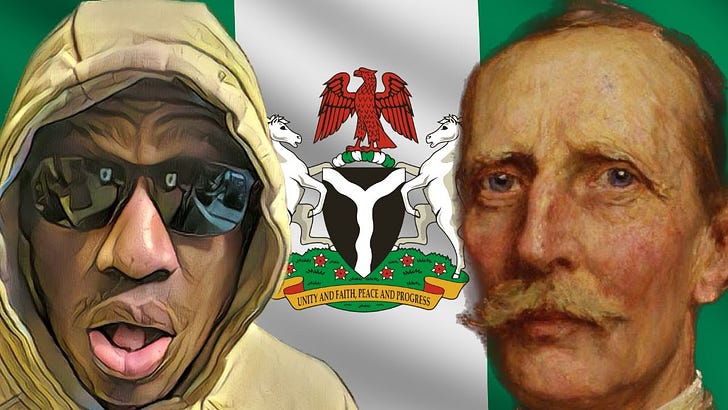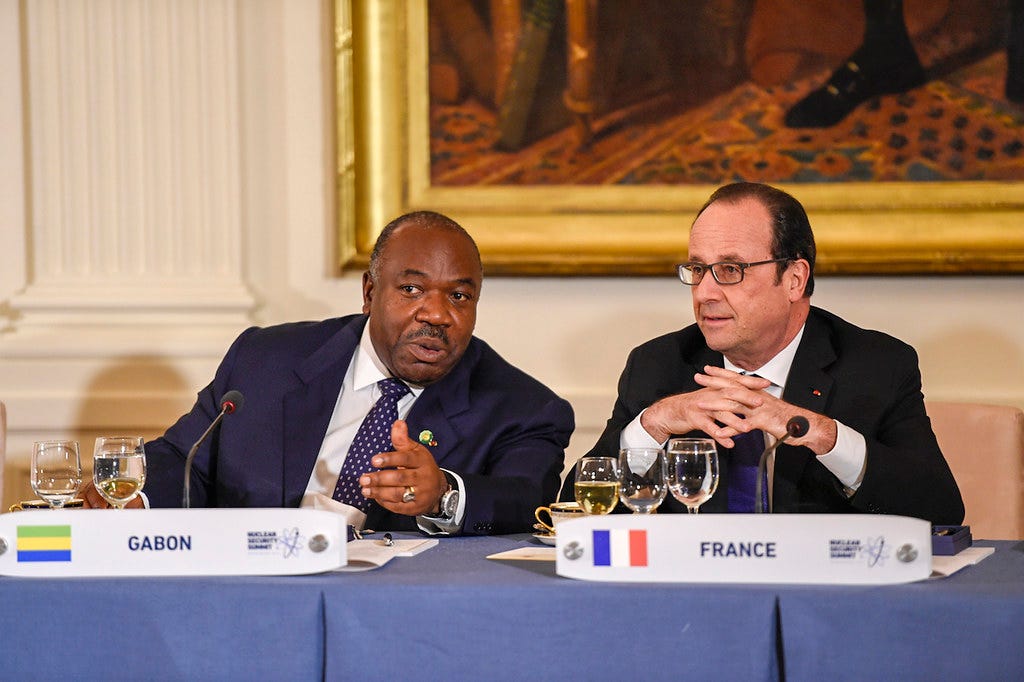The Gabon coup will not be the last in Africa
A rising tide of freedom and the quest for autonomy in the shadow of colonialism. A look at the history of Gabon and the end of an era
For those who like to listen on the go, I will do audio versions of my articles from time to time (not always! however it’s a nice perk only for my paid subscribers). Here is a free audio version of this article. You can get complimentary access to my premium posts and audio by inviting your friends and family to Alkebulan. Click the link below for more info.
Another Coup In Africa
I was browsing the internet and doing my usual social media survey. I started getting pings and scrolled to the ForYou of my TikTok. Video after video of another African coup. This time it was Gabon. I had talked a great deal about the recent coup in Niger and the unfortunate reaction of ECOWAS to that situation. That is ongoing and we have another African nation following suit. The question many will be asking is, ‘why are there so many coups all of a sudden in Africa.’
Well, it isn’t sudden. This is the inevitable result of an unfortunate history.
This latest military coup has sent ripples across the continent, echoing a sentiment that has been growing louder in recent years: Africa's push for genuine autonomy and a collective dissatisfaction with the lingering legacy of colonialism. I want to take this in two stages. First let us take a look at the history of Gabon so that we have some context on what is happening there today.
The Pre-Colonial Era & First Contact with Europeans
Before the advent of European explorers, Gabon was inhabited by various Bantu groups. These communities had established intricate social structures and trade networks, primarily dealing in iron, textiles, and agricultural products.
The Portuguese explorer Lopo Gonçalves is believed to be the first European to arrive at the Gabonese coast in 1472. He named the estuary "Gabão," a Portuguese word for "cloak," inspired by the shape of the Komo River estuary. Over the next few centuries, European traders, particularly the Dutch, French, and Portuguese, frequented the region, primarily engaging in the slave trade.
In the mid-19th century, France began to establish a more permanent presence in Gabon. The French explorer Pierre Savorgnan de Brazza signed treaties with several Gabonese chiefs in the late 1870s and early 1880s, establishing French protectorates in the region. By 1885, at the Berlin Conference, European powers recognized French rights over the territory, marking the beginning of Gabon's official status as a French colony. I spoke about the Berlin Conference in my Origin Of Nigeria article which you can read here…
Colonial Exploitation
Under French rule, Gabon's rich natural resources, including timber, rubber, and minerals, were heavily exploited. The French introduced forced labor practices, compelling Gabonese people to work on infrastructure projects and in extractive industries. This exploitation laid the groundwork for Gabon's economic disparities, with the wealth generated from its resources benefiting the French more than the local population. This is mirrored all over Africa with every colonial power utilising the same exploitative tactics.
Post World War II many African nations pushed for independence from their colonial rulers. In 1958, Gabon became an autonomous republic within the French Community. Gabon officially gained independence from France on August 17, 1960. Léon M'ba became the country's first Prime Minister and later its first President.
Post-Independence Era
While Gabon gained political independence, the economic structures established during the colonial era persisted. The country's vast oil reserves, discovered in the 1970s, made it one of Africa's wealthier nations or rather, this was what should have happened. In reality, as with all other resource rich African countries, the wealth was not evenly distributed, leading to significant economic disparities reminiscent of the colonial era.
Gabon's history, like many African nations, is deeply intertwined with colonialism. The legacy of French rule has left an indelible mark on the country's political, economic, and social fabric. Now that you understand where Gabon came from and how it got to where it is today, let’s go back to the coup.
The ousting of President Ali Bongo Ondimba in Gabon is not an isolated incident. It's a chapter in a series of political upheavals that have swept across Africa's former French colonies, including Mali, Guinea, Burkina Faso, Chad, Niger, and Tunisia. Each coup, while unique in its circumstances, carries a common thread - a deep-seated desire to break free from centuries, of external influence and control.
The Bongo Dynasty and Colonial Shadows
Omar Bongo got into office in 1967 at only 31. He died in office in 2009. His time as president is marked by a strong alliance with former colonial masters France. His legacy came under scrutiny posthumously, with allegations of embezzlement and the amassing of significant properties in France.
The crazy thing is that his son, Ali Bongo, ‘won’ the elections after his father’s death and took over the presidency. There were allegations of electoral fraud but he staying in office till the recent coup. In total the Bongo family stayed in power for over 55 years! That’s astonishing.
The main thing to note is that while Ali Bongo tried to assuage anger over his father’s dealings with France by offering to give his father’s Paris based properties to Gabon, he maintained a strong relationship with France. This did not please a lot of the Gabonese who have been living in poverty.
The entire Gabon population is only about 2.5 million people. To put that in context the population of New York City is 20 million. The population of Lagos is 15 million. The population of Dubai is 3.5 million. Gabon is one of the most oil rich countries in Africa yet most of the population live in property even though they have less people in the entire country than many major cities. The level of corruption necessary to maintain this is staggering. The people of Gabon should be all living like kings. Gabon should be the Dubai of Africa. However, again this is all rooted in history.
The colonial era, marked by European powers carving up the continent for their benefit, left an indelible mark on Africa. The borders drawn by colonizers often disregarded ethnic and cultural divisions, leading to internal conflicts that persist to this day. The economic systems established during colonial rule favored the colonizers at the expense of the local population. This economic disparity in Gabon, with its vast oil wealth yet significant poverty, is why they are rightly angry.
The people of Gabon have simply had enough.
The Youth Is Africa’s New Vanguard
Africa is home to the world's youngest population, with a median age of around 19 years. This young demographic, equipped with global perspectives and digital tools, is less willing to accept the status quo. They are disillusioned with the seemingly unending cycle of corruption, mismanagement, and the economic disparities that have roots in the colonial era.
Their demand for change, as seen in the celebrations post-coups, is not just for new leadership but for a complete overhaul of systems that have perpetuated colonial legacies. We literally have youngsters throwing parties for the coup plotters. How then can you justify telling these people that they must endure the leaders they were so desperate to unseat? More importantly how can outsiders feel they have a right to say this much less the likes of France?
The International Response: A Double-Edged Sword
While international bodies like the African Union and the United Nations have condemned these coups, their response reeks of colonialism. Africans no longer want to be told what to do. We’re tired of that rhetoric. That is why I say this will not be the last coup in Africa. With each successful overthrow, other disgruntled African nations watch intently and are certainly considering replicating the scenario for themselves.
PAY ATTENTION








I’m not sure this coup in Gabon will bring out any change for the people, as the coup leader is a cousin of Ali Bongo, and he was also accused of embezzling and has properties in France, so I’m pretty sure he gonna continue dealing with the French government
I watched your latest video on Gabon, it was a true revelation, eye opening to say the least, regarding manipulative strategies use to lie to and deceive the people. It really puts you in an investigative mind frame, to look beyond the superficial and deceitfully misleading information. They were pretending to be the movement of freedom fighters. Only to be France’s puppets, masquerading as true liberation. Thank you for unveiling the lies ✊🏾✊🏿🙏🏾